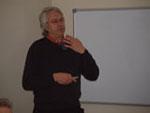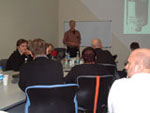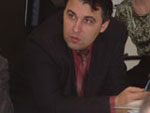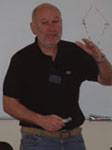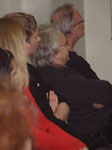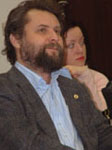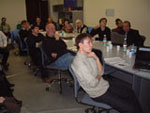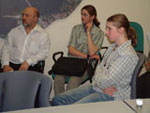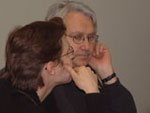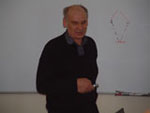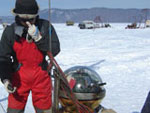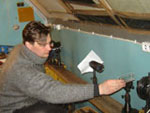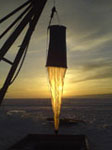Research-Educational Center “Baikal“
 Projects
Projects |
 Library
Library |
 Seminars, conferences
Seminars, conferences |
Baikal School
“Physical Limnology and Limno-Physics and Sediment Archives”
An international school “Physical Limnology and Sedimentology” was held on Lake Baikal from 3 to 12 March 2008. Besides REC “Baikal”, the convener of this school was Swiss Federal Institute of Aquatic Science and Technologies (EAWAG), the largest scientific institute in Switzerland and a world leader in studies of water resources.
The school programme consisted of two stages. At the first stage, scientists from EAWAG, Aarhus University (Denmark), Irkutsk State University, Limnological Institute and Institute of Earth Crust SB RAS gave 16 lectures in the REC Communication Center devoted to the most actual aspects in studies of hydrophysical phenomena and their effect on the development of biogeochemical processes in Lake Baikal. At the second stage, students and postgraduates of Irkutsk State University, as well as students of Tomsk State University and Irkutsk Agricultural Academy visited the Baikal Station of Scientific Research Institute of Applied Physics where a neutrino telescope was installed, 3.5 km off the shore. Every year researchers of the Institute together with representatives of scientific organizations of Irkutsk, Russia and Europe set up a camp on the ice and carry out the programme of the Baikal Neutrino Project on interdisciplinary studies of the lake. Unique technologies and instruments developed within the framework of the Project allow to carry out a long-term multi-parameter monitoring of huge masses of water. More and more scientists all over the world are involved in this Project. For the last 15 years the EAWAG specialists have been coming to Lake Baikal and together with Irkutsk colleagues monitoring vertical and horizontal water exchange, internal waves, thermal regime, and studying processes of formation of bottom sediments. The data obtained are used in studies of different scientific disciplines and help solve practical problems. For example, sediments preserve the history of the Baikal territory including information on climatic peculiarities, geological phenomena, and biological species existing in different epochs. Hydrophysical processes are responsible for self-purification of the lake. For example, the studies of these processes can show if Lake Baikal is able to cope with the operation of Baikalsk Pulp and Paper Plant. The active exchange of surface and deep waters is closely connected with hydrobiology. This exchange provides necessary conditions for the existence of living organisms in the lake: saturation with oxygen at all the depths and ascending of nutrients from the bottom to the upper layers.
Thanks to the productive cooperation of Irkutsk and Swiss scientists, valuable information has been collected for these years, as well as research works have been published. The main aim of this School was to introduce beginners to the results of studies obtained by their senior colleagues and to give opportunities in gaining practical experience. Taking part in the ice expedition, the School students were able to sample bottom sediments and measure temperature regime, conductivity, optical parameters and other physical characteristics of water. They worked with the equipment in situ and read instrumentation data which had been collected in Lake Baikal for a year. Then they carried out primary treatment and analysis of the samples obtained.
The involvement of youth in research work is one of the most important activities of REC “ Baikal”. Mike Sturm, a famous scientist-sedimentologist from EAWAG, considers that Baikal schools help realize plans. He continues that “in teachers’ understanding, seniors give knowledge to juniors. Such a strategy is usually inefficient. The strategy of your School is quite different: juniors acquire knowledge from seniors, questions arise and thus there is a feedback between them… The idea of holding such schools is brilliant because the problem of how to teach young specialists and how to stir their enthusiasm has been solved.”
“Physical Limnology and Sedimentology” is the Second Baikal School which REC “Baikal” organized together with foreign colleagues. Last summer, a pilot Russian-German School “ Limnoecology of Lake Baikal” was launched. It allowed to determine general principles of the organization of such activities at the station of our Research and Educational Center.
If you find an error in this web page, please select the erroneous text and press Ctrl+Enter.








